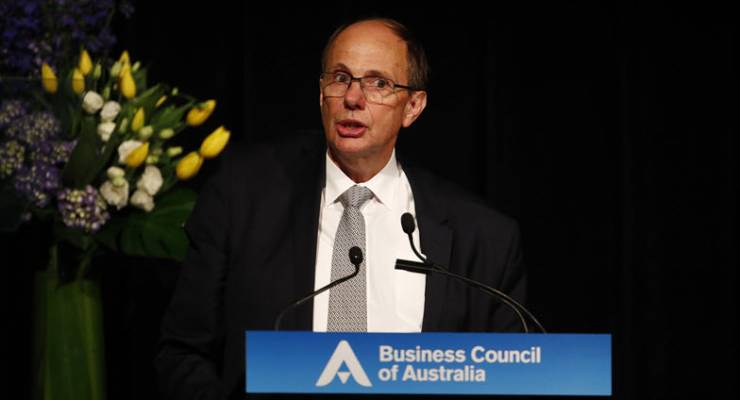
Coalition Senator Eric Abetz has only a nodding acquaintance with events here on Earth, but he has great value as an indicator of thinking within sections of the right. Upon becoming Tony Abbott’s industrial relations minister, he warned of a wages explosion just as Australian workers were entering an extended period of stagnant real wages. But Abetz was really reflecting the view of many Liberals and employer groups that Australian workers had too much power, not what was happening in workplaces.
So pay attention to the Tasmanian Senator’s views, no matter how little correlation they have with reality.
Over the break, Abetz emerged to tell the West Australian’s excellent Shane Wright that government spending needed to be slashed. “With more than half the Budget being spent on health and welfare, it is clear that our current fiscal situation is unsustainable,” Abetz told Wright. Like Tony Abbott demanding spending cuts, it was funny stuff from a senior member of one of Australia’s most profligate governments.
But Abetz’s comments have a resonance with similar comments made in the US after the passage of Donald Trump’s tax handout to corporations late last year. Those tax cuts, notably, were unfunded. But after corporations won their tax cut in the US, Trump and the Republicans flagged where they wanted to find offsetting savings. “We’re going to go into welfare reform,” said Trump. House Speaker Paul Ryan and prominent Republicans like Marco Rubio also indicated they now had their sights on slashing welfare and health spending.
This is no surprise. As Democrat Bernie Sanders noted about the GOP, “when you run up the deficit, your next argument will be, ‘Gee, you’ve got a large deficit’.” Indeed, this strategy of using tax cuts to justify cutting social services spending has its own name: Starving the Beast. Republicans deliberately implement unfunded tax cuts, then lament the resulting deficit blowout and call for spending cuts to fix it.
The Business Council of Australia has cut-and-pasted Starving the Beast into its own approach here. The BCA wants the massive corporate tax cut proposed by the Turnbull government — cost, $60+ billion over a decade and counting — to be funded by spending cuts. In particular, health and welfare spending. In March, BCA CEO Jennifer Westacott wrote “[l]ocking in enduring prosperity requires us to overhaul the way we think about government spending and smash the illusion that more money necessarily means better outcomes … There is a political challenge here. It’s hard to communicate that containing growth in spending in health and education doesn’t mean reduced outcomes. However, the conversation must be had.”
Just a month earlier, the BCA demanded that government “formulate a long-term prescription for effectively reshaping health expenditures while ensuring strong health outcomes for the community.” And increased taxation to pay for growing health costs was, apparently, a snake oil/bandaid solution/insert health cliché of choice: “any revenue solution to the rising costs of healthcare, such as a higher GST or a bigger Medicare levy is likely to be absorbed, like aspirin, into the system, simply masking the source of the pain.”
This isn’t a new approach from the BCA; back in Tony Shepherd’s days, he called for cuts to health and education (you’d recall Shepherd made a fool of himself on health spending when he later ran Abbott’s Commission of Audit). In fact, the BCA has a whole section of its website devoted to trying to “redesign health spending programs to deliver greater value, and reduce waste and inefficiency”. And in last year’s budget submission, the BCA repeated its argument that increases in education funding hadn’t worked and it was time to overhaul the funding system (again).
What about defence, which at over $30 billion is about the same size as education in the Commonwealth budget and which will grow rapidly over the next decade as Australia inefficiently and wastefully spends billions more than needed locally building new naval vessels? In the US, Republicans rarely target defence spending for cuts — in fact, they regularly push for defence increases. Well, ditto for the BCA: there’s no “defence” page on the BCA site where the case for curbing defence waste is articulated. Indeed, if you search for “defence” on the BCA site, you’ll find very few references — and virtually none in recent years. Like the Republicans, the BCA seems to regard defence spending as, to use Tony Shepherd’s phrase, “exempt from cuts”.








Abetz represents only those in close agreement with himself and this can amount to on occasion, himself. For those in need or the other aligned , forget it. Much of this contrary to his ceaselessly expressed Christian values.
Challenge the BCA and its members to guarantee the outcomes they claim, or lose their companies to the government.
The world would be a far better place if every single member of the BCA was dropped off a 1000m cliff without a parachute.
Similar to the tragedy of a bus laden with economists crashing into a ravine with empty seats.
“..smash the illusion that more money necessarily means better outcomes…”
Well Ms Westacott of the BCA, that statement would deny the need for corporate tax cuts, wouldn’t it?
lol. Maybe that’ll be their excuse when they don’t “create” a bunch of jobs.
Of course the workers have “too much power” – the infallible masters think they shouldn’t have any.
…. Where would Erica get a job that pays anything like the one he’s sitting on now?….
The workers certainly do have “too much power.” Before you know it they’ll be wanting the right to vote. Lucky there’s nobody they can vote for who would make any meaningful changes. Don’t tell them they could get together and form a workers’ party.